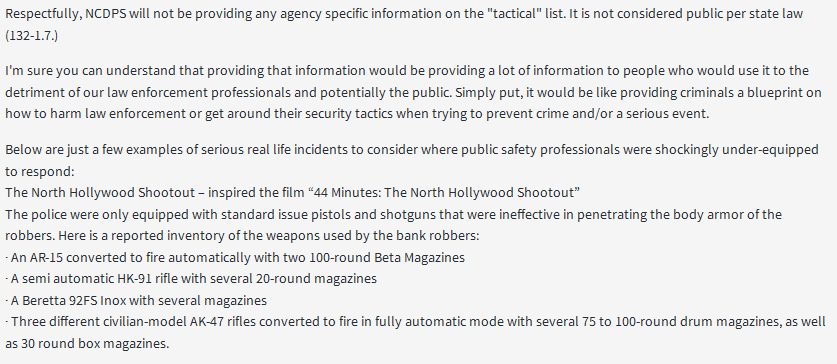The North Carolina Attorney General has spoken: the state must, in fact, release data detailing which police departments received excess military equipment. The ruling reverses the position taken by state public safety officials that disclosing this information would be akin to publishing a blueprint for scofflaws.
The advisory opinion, published earlier this month, directed the North Carolina Department of Public Safety that a “a plain reading of the statute” requires such disclosure.

In August, as part of a nationwide survey, MuckRock submitted a request to the North Carolina Department of Public Safety for a spreadsheet of all equipment distributed to law enforcement agencies across the state via the Pentagon’s 1033 program. Where most states provided the requested spreadsheets over the next few weeks, North Carolina was among the minority that rejected the request.
“I’m sure you can understand that providing that information would be providing a lot of information to people who would use it to the detriment of our law enforcement professionals and potentially the public,” responded Pamela Walker, the agency’s communications director, in September.
“Simply put, it would be like providing criminals a blueprint on how to harm law enforcement or get around their security tactics when trying to prevent crime and/or a serious event.”

North Carolina’s public records statute does not outline any process for appealing such a rejection. MuckRock nonetheless continued for several weeks to press the state’s 1033 program coordinator to follow the example of dozens of other states and release detailed data on tactical equipment allocated to police in the state.
“I have taken your request to the top management in the agency,” Walker answered. “They stand by the decision.”
But in late November, after previously insisting that such information was exempt under the federal Freedom of Information Act, the Pentagon released the same data on 1033 program equipment transfers for the entire country. A White House panel similarly advised President Obama in early December that the 1033 program needed increased public scrutiny and transparency.
The Pentagon’s disclosure at the national level prompted the state of Michigan to backpeddle on its withholding of agency-by-agency data in response to MuckRock’s appeal.
While North Carolina has no appeal process, officials with the Department of Public Safety sought an advisory opinion from the state attorney general, who likewise ruled that the data belongs in the public domain.
“While I am cognizant of the potential security implications if the equipment inventories are disclosed,” wrote Assistant Attorney General Tammera Hill in the January 9 letter, my conclusion is that the information is considered public […] and is not otherwise exempted from disclosure.”
The exemption to North Carolina’s public records law cited by Walker in September covers “specific details of public security plans and arrangements,” and makes no mention of equipment. As such, Hill concluded, the exemption was inappropriately stretched to cover the requested data.
Such reversals by Michigan and North Carolina means that only five states — Alabama, Massachusetts, New Jersey, South Dakota and West Virginia — continue to reject requests for detailed data on 1033 program transfers of military equipment to police.
Read the AG’s letter on the request page, or embedded below:
Image via Wikimedia Commons




